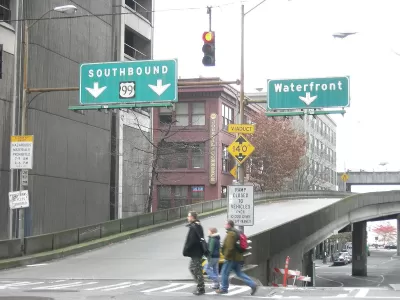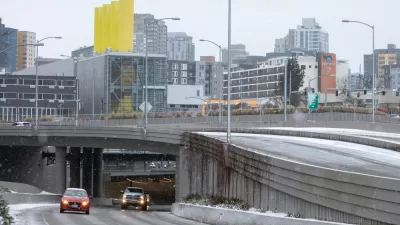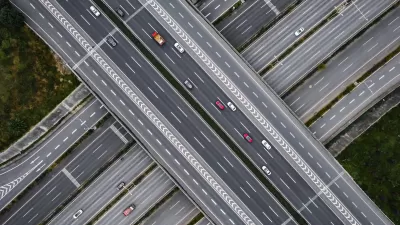South Park becomes the latest community to call for the removal of a highway segment that has cut off the neighborhood from local amenities for decades.

Seattle's South Park neighborhood is joining the growing chorus of voices demanding the removal of urban freeways that have, for decades, divided neighborhoods and cut off communities from city amenities, transportation, and opportunities. According to Agueda Pacheco, a group called Reconnect South Park "not only wants to remove the segment of SR-99 that cuts through the neighborhood, it also wants to create a land trust to ensure the 40 acres it will free up are developed equitably."
Calling the freeway a "monument to redlining," Coté Soerens, who leads the nonprofit Cultivate South Park, says the neighborhood needs more land for community uses. Soerens argues that decommissioning the segment of SR-99 that cuts off South Park from the rest of the city would benefit the many children who live and go to school in Seattle's youngest neighborhood. "The health risks facing South Park residents have long been known — nestled between major highways, industry, and the Duwamish – a superfund site and one of the most polluted areas of the country — life expectancy for residents is much less than those of their neighbors," writes Pacheco.
After decades of rampant freeway construction that ripped through low-income neighborhoods across the country, the freeway removal movement is gaining momentum in policy circles, with federal officials now calling for action to "reconnect communities" and reverse the devastation caused by road construction projects.
FULL STORY: South Park Joins Growing Movement to Dismantle Freeways

Planetizen Federal Action Tracker
A weekly monitor of how Trump’s orders and actions are impacting planners and planning in America.

Congressman Proposes Bill to Rename DC Metro “Trump Train”
The Make Autorail Great Again Act would withhold federal funding to the system until the Washington Metropolitan Area Transit Authority (WMATA), rebrands as the Washington Metropolitan Authority for Greater Access (WMAGA).

The Simple Legislative Tool Transforming Vacant Downtowns
In California, Michigan and Georgia, an easy win is bringing dollars — and delight — back to city centers.

The Small South Asian Republic Going all in on EVs
Thanks to one simple policy change less than five years ago, 65% of new cars in this Himalayan country are now electric.

DC Backpedals on Bike Lane Protection, Swaps Barriers for Paint
Citing aesthetic concerns, the city is removing the concrete barriers and flexposts that once separated Arizona Avenue cyclists from motor vehicles.

In These Cities, Most New Housing is Under 441 Square Feet
With loosened restrictions on “micro-housing,” tiny units now make up as much as 66% of newly constructed housing.
Urban Design for Planners 1: Software Tools
This six-course series explores essential urban design concepts using open source software and equips planners with the tools they need to participate fully in the urban design process.
Planning for Universal Design
Learn the tools for implementing Universal Design in planning regulations.
Smith Gee Studio
City of Charlotte
City of Camden Redevelopment Agency
City of Astoria
Transportation Research & Education Center (TREC) at Portland State University
US High Speed Rail Association
City of Camden Redevelopment Agency
Municipality of Princeton (NJ)





























